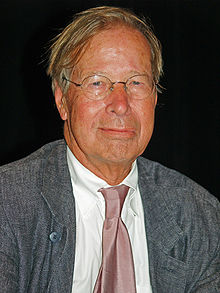Ronald Dworkin
Appearance

Ronald Dworkin (11 December 1931 - 14 February 2013) was an American legal philosopher.
Quotes
[edit]- Discretion, like the hole in a doughnut, does not exist except as an area left open by a surrounding belt of restriction. It is therefore a relative concept. It always makes sense to ask, "Discretion under which standards?" or "Discretion as to which authority?"
- Taking Rights Seriously (1978), p. 31
- 'Nixon is no longer president, and his crimes were so grave that no one is likely now to worry very much any more about the details of his own legal philosophy. Nevertheless in what follows I shall use the name 'Nixon' to refer, not to Nixon, but to any politician holding the set of attitudes about the Supreme Court that he made explicit in his political campaigns. There was, fortunately, only one real Nixon, but there are, in the special sense in which I use the name, many Nixons.'
- Taking Rights Seriously (1978), p. 164
- We live in and by the law. It makes us what we are: citizens and employees and doctors and spouses and people who own things. It is sword, shield, and menace: we insist on our wage, or refuse to pay our rent, or are forced to forfeit penalties, or are closed up in jail, all in the name of what our abstract and ethereal sovereign, the law, has decreed. And we argue about what it has decreed, even when the books that are supposed to record its commands and directions are silent; we act then as if law had muttered its doom, too low to be heard distinctly. We are subjects of law's empire, liegemen to its methods and ideals, bound in spirit while we debate what we must therefore do.
- Law's Empire (1986), Preface
- She ends her letter, characteristically, by picturing me and her other critics as indifferent to the suffering of women. But many feminists, including several who wrote or spoke to me about my review, regret her single-minded concentration on lurid sex. They think that though it has predictably attracted much publicity, it tends to stereotype women as victims, and takes attention from still urgent questions of economic, political, and professional equality.
- "Pornography: An Exchange", response to Catharine MacKinnon, New York Review of Books 41(5), (3 March 1994)
- Perhaps MacKinnon should reflect on these suggestions that the censorship issue is not so simple-minded, so transparently gender-against-gender, as she insists. She should stop calling names long enough to ask whether personal sensationalism, hyperbole, and bad arguments are really what the cause of sexual equality now needs.
- "Pornography: An Exchange", response to Catharine MacKinnon, New York Review of Books 41(5), March 3, 1994.
- If we are to be morally and ethically responsible, there can be no turning back once we find, as we have found, that some of the most basic presuppositions of these values are mistaken. Playing God is indeed playing with fire. But that is what we mortals have done since Prometheus, the patron saint of dangerous discoveries. We play with fire and take the consequences, because the alternative is cowardice in the face of the unknown.
- Sovereign Virtue (2000), p. 446
- We want to live decent, worthwhile lives, lives we can look back on with pride not shame. We want our communities to be fair and good and our laws to be wise and just. These are enormously difficult goals, in part because the issues at stake are complex and puzzling. When we are told that whatever convictions we do struggle to reach cannot in any case be true or false, or objective, or part of what we know, or that they are just moves in a game of language, or just steam from the turbines of our emotions, or just experimental projects we should try for size, to see how we get on, or just invitations to thoughts that we might find diverting or amusing or less boring than the ways we used to think, we must reply that these denigrating suggestions are all false, just bad philosophy. But these are pointless, unprofitable, wearying interruptions, and we must hope that the leaden spirits of our age, which nurture them, soon lift.
- Objectivity and Truth: You'd Better Believe It. Published on Philosophy & Public Affairs, Vol. 25, No. 2 (Spring, 1996), pp. 87--139.

